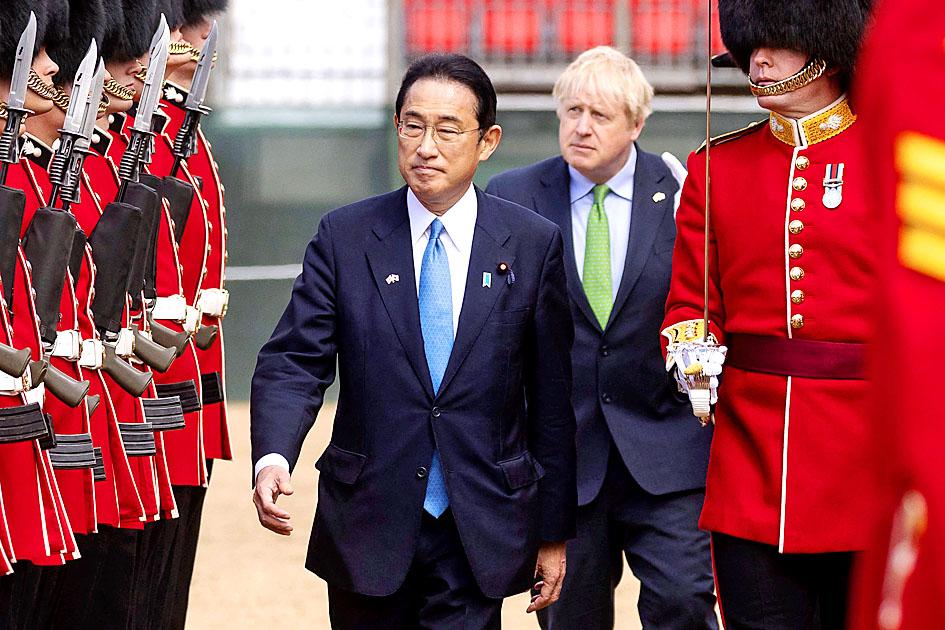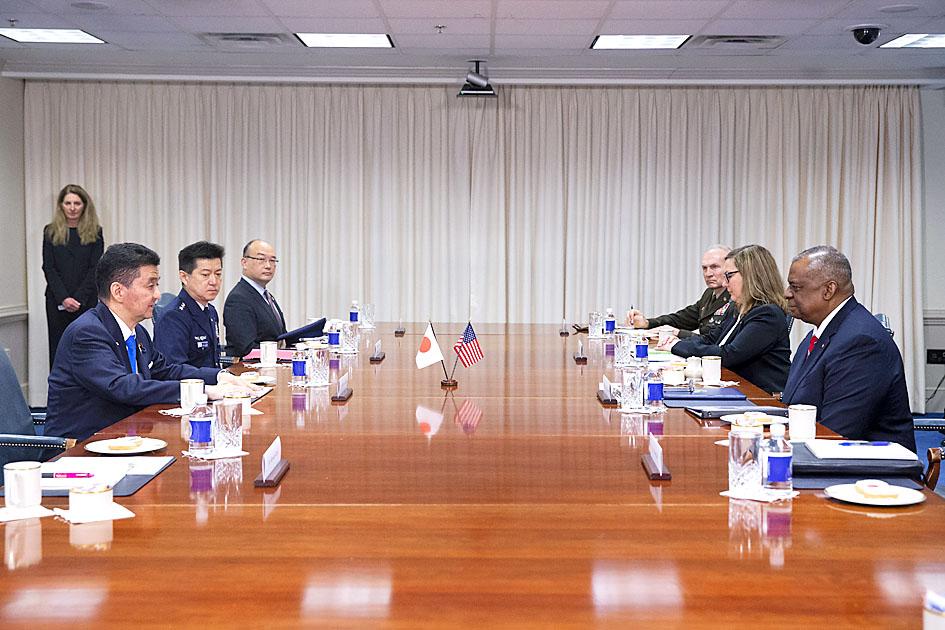Japanese Prime Minister Fumio Kishida on Thursday warned that the invasion of Ukraine could be replicated in East Asia if leading powers do not respond as one, saying that peace and stability in the Taiwan Strait must be maintained.
Kishida, speaking in London through a translator after a meeting with British Prime Minister Boris Johnson, said now was the time for G7 nations to solidify their unity.
“Collaboration among countries sharing universal values becomes ever more vital,” he said. “We must collaborate with our allies and like-minded countries, and never tolerate a unilateral attempt to change the status quo by the use of force in the Indo-Pacific [region], especially in East Asia.”

Photo: AFP
“Ukraine may be East Asia tomorrow,” he added.
“Peace and stability in the Taiwan Strait is critical not only for Japan’s security, but also for the stability of international society,” Kishida said. “Japan maintains its position to expect a peaceful resolution through dialogue to issues surrounding Taiwan, and the situation will be watched carefully from that perspective.”
In Taipei, Ministry of Foreign Affairs spokeswoman Joanne Ou (歐江安) yesterday thanked Kishida for his comments, saying they “not only reflect the aspirations of democratic countries, but also win the recognition and approval of the international community.”

Photo: EPA-EFE
Chinese Ministry of Foreign Affairs spokesman Zhao Lijian (趙立堅) said that Japan was exaggerating a perceived threat from Beijing as an excuse to boost its military might.
“If Japan really wants peace and stability in East Asia, it should immediately stop provoking confrontation between big powers and do more to help increase the trust between regional countries, and promote regional peace and stability,” Zhao told a regular news briefing in Beijing.
During the London meeting, Johnson announced that the militaries of the UK and Japan would “work more closely together’” under a defense deal.
Kishida also announced new sanctions, including an asset freeze on 140 Russians and the expansion of an export ban to include Russian military firms.
Kishida’s Liberal Democratic Party has also proposed a substantial increase in defense spending — possibly to an amount on par with 2 percent of GDP, up from 1 percent — and the development of the capacity to attack missile-launching sites in an enemy’s territory.
In Washington, Japanese Minister of Defense Nobuo Kishi and US Secretary of Defense Lloyd Austin on Wednesday vowed to defend the rules-based international order in a meeting at the Pentagon.
The US and Japan would enhance cooperation to oppose China’s expansionism in the East and South China seas to prevent any change by force to the “status quo” in the region, they said.
The countries are to counter threats emanating from Russia’s invasion of Ukraine and North Korea’s nuclear tests, they added.
Tokyo is to revise its National Security Strategy to allow the possession of counterstrike capabilities against long-range missiles before the end of the year, Kishi said.
Austin was quoted by the Pentagon as saying that the US reaffirms “unwavering commitment to the defense of Japan to include our extended deterrence commitments using our full range of conventional and nuclear capabilities.”
Additional reporting by Lin Tsuei-yi and Jonathan Chin, with CNA, AP and the Guardian

ENDEAVOR MANTA: The ship is programmed to automatically return to its designated home port and would self-destruct if seized by another party The Endeavor Manta, Taiwan’s first military-specification uncrewed surface vehicle (USV) tailor-made to operate in the Taiwan Strait in a bid to bolster the nation’s asymmetric combat capabilities made its first appearance at Kaohsiung’s Singda Harbor yesterday. Taking inspiration from Ukraine’s navy, which is using USVs to force Russia’s Black Sea fleet to take shelter within its own ports, CSBC Taiwan (台灣國際造船) established a research and development unit on USVs last year, CSBC chairman Huang Cheng-hung (黃正弘) said. With the exception of the satellite guidance system and the outboard motors — which were purchased from foreign companies that were not affiliated with Chinese-funded

PERMIT REVOKED: The influencer at a news conference said the National Immigration Agency was infringing on human rights and persecuting Chinese spouses Chinese influencer “Yaya in Taiwan” (亞亞在台灣) yesterday evening voluntarily left Taiwan, despite saying yesterday morning that she had “no intention” of leaving after her residence permit was revoked over her comments on Taiwan being “unified” with China by military force. The Ministry of the Interior yesterday had said that it could forcibly deport the influencer at midnight, but was considering taking a more flexible approach and beginning procedures this morning. The influencer, whose given name is Liu Zhenya (劉振亞), departed on a 8:45pm flight from Taipei International Airport (Songshan airport) to Fuzhou, China. Liu held a news conference at the airport at 7pm,

Taiwan was ranked the fourth-safest country in the world with a score of 82.9, trailing only Andorra, the United Arab Emirates and Qatar in Numbeo’s Safety Index by Country report. Taiwan’s score improved by 0.1 points compared with last year’s mid-year report, which had Taiwan fourth with a score of 82.8. However, both scores were lower than in last year’s first review, when Taiwan scored 83.3, and are a long way from when Taiwan was named the second-safest country in the world in 2021, scoring 84.8. Taiwan ranked higher than Singapore in ninth with a score of 77.4 and Japan in 10th with

GRIDLOCK: The National Fire Agency’s Special Search and Rescue team is on standby to travel to the countries to help out with the rescue effort A powerful earthquake rocked Myanmar and neighboring Thailand yesterday, killing at least three people in Bangkok and burying dozens when a high-rise building under construction collapsed. Footage shared on social media from Myanmar’s second-largest city showed widespread destruction, raising fears that many were trapped under the rubble or killed. The magnitude 7.7 earthquake, with an epicenter near Mandalay in Myanmar, struck at midday and was followed by a strong magnitude 6.4 aftershock. The extent of death, injury and destruction — especially in Myanmar, which is embroiled in a civil war and where information is tightly controlled at the best of times —